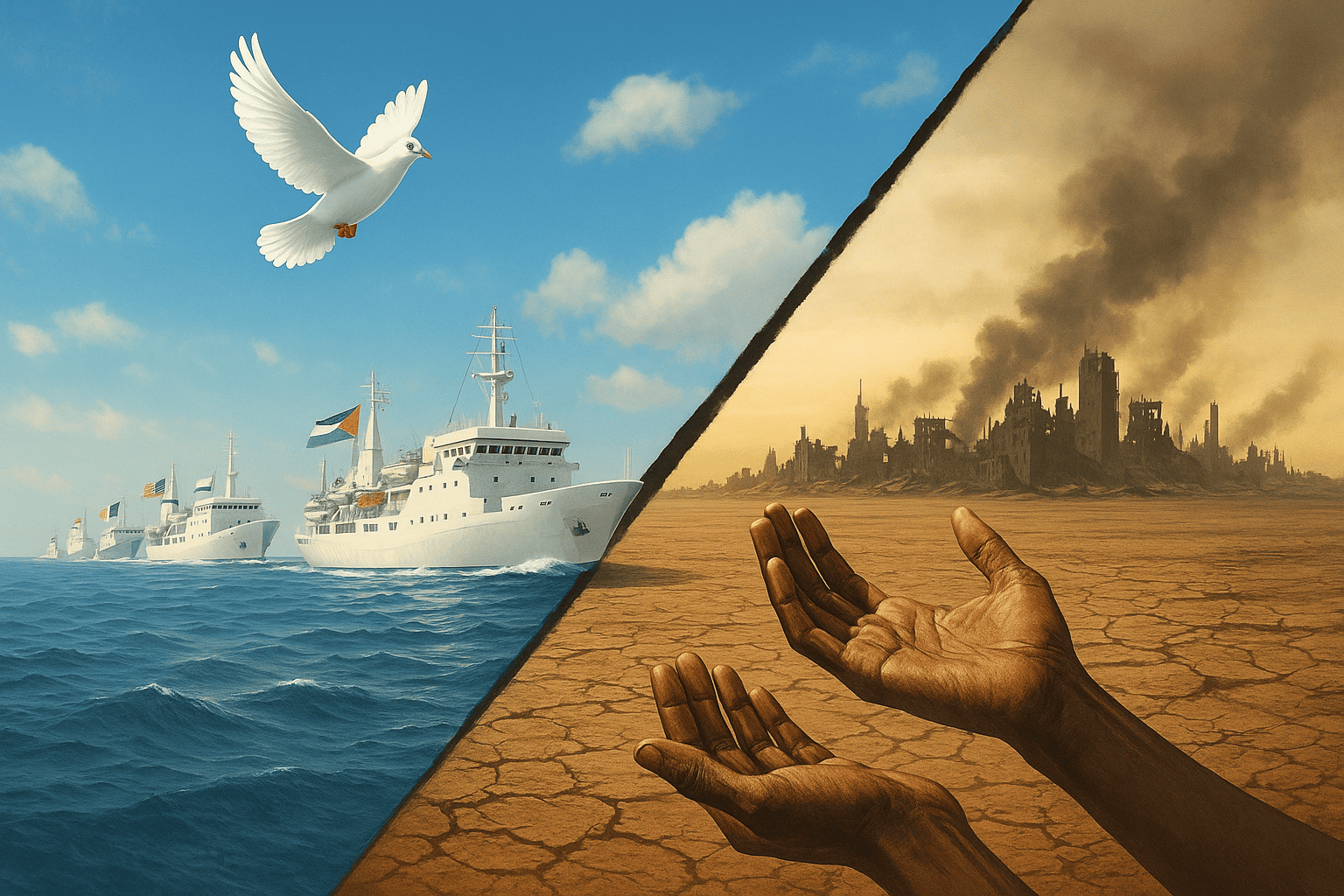
Hunger That Kills
The Gaza Strip is on the brink of total humanitarian collapse. Years of blockade and repeated attacks have left people without reliable access to food, clean water, and medicine.
According to Gaza’s Ministry of Health, since October 2023, 455 Palestinians have died of hunger and malnutrition, including 151 children. In just the last 24 hours, two more lives were lost.
On August 22, 2025, the Integrated Food Security Phase Classification (IPC) officially raised Gaza’s hunger level to Phase 5 – catastrophic famine. Since then, another 177 people have died of starvation, including 36 children.
The UN and other agencies warn: Israel is effectively using hunger and thirst as weapons, cutting off access to the most basic human needs.
Daily Survival
- 80% of the population depends on humanitarian aid.
- More than 70% of households face food insecurity.
- 97% of Gaza’s water is unfit for consumption.
- 1 in 4 children suffers from chronic malnutrition.
Families live in makeshift tents and overcrowded schools with no sanitation, while infectious diseases spread rapidly. Mothers mix sugar with water to replace milk. Surgeons perform operations under the light of cellphones — and often without anesthesia.
What the Flotilla Brings
On board the dozens of ships: flour, medical supplies, water filters, and basic medicines. Among the participants are human rights activists, doctors, and journalists from over 30 countries. A symbolic figure aboard is Greta Thunberg, whose presence has amplified global attention.
Organizers insist the cargo is purely humanitarian:
“We carry no weapons. Only medicine and hope,” declared one captain.
Dangers and Confrontations
The flotilla has faced growing pressure in 2025:
- Drones flying overhead, dropping sound bombs.
- The Family Boat, one of the main vessels, caught fire and had to be abandoned.
- Israel offered to unload the cargo in Ashkelon; Italy suggested Cyprus. The flotilla refused, saying this would “legitimize the blockade.”
Escalation on October 1, 2025
During the night, the flotilla suffered a cyberattack on its GPS and internet systems. The flagship Alma temporarily lost contact with the group.
By morning, an Israeli naval vessel approached dangerously close — just five feet from Alma — blocking its engine and communication. Activists, following safety protocols, threw their phones into the sea to prevent tracking.
Later, the warship withdrew, and the flotilla resumed its course. At that time, it was 121 nautical miles (225 km) from Gaza’s shores.
Activist Zeynel Abdin Ozkan warned:
“Today is especially dangerous. We are only hours away from Gaza. If attacks begin, we call on the world not to abandon us.”
Timeline of the Mission
- September 23, 2025 — Departure from ports in Italy and Spain.
- September 25, 2025 — Greta Thunberg joins; Israel warns no ships will be allowed near Gaza.
- September 26, 2025 — Fire damages the Family Boat.
- September 28, 2025 — Reports of drones harassing vessels.
- September 29, 2025 — Italian and Spanish naval ships appear nearby.
- September 30, 2025 — Human rights groups demand safe passage; Israel repeats its offer of Ashkelon.
- October 1, 2025 — Cyberattack on GPS, dangerous confrontation with Israeli warship.
Faces Behind the Headlines
Dr. Samir, the Surgeon in Darkness
“I have performed surgeries without anesthesia. The flotilla is not politics for me — it’s a chance to save lives tomorrow.”
Mariam, the Mother Waiting by the Sea
“My daughter coughs all night. She doesn’t understand what a blockade is. She only asks: Mama, when will it stop?”
Captain Andreas, Steering Through Uncertainty
“I could be carrying tourists to Santorini. Instead, I carry the conscience of the world. If they stop us, the world must ask: why block bread and medicine?”
Yara, the 19-Year-Old Student
“We don’t want to be statistics. We want the world to know our names. Maybe the flotilla will bring us not just food, but dignity.”
Global Reactions
- United Nations expressed “deep concern” over rising deaths from hunger.
- European Union remains divided: Spain and Ireland back the flotilla, while Germany and France insist on “coordination with Israel.”
- United States called for ensuring Israel’s security but also urged not to obstruct humanitarian aid.
- Turkey and Qatar openly support the mission.
- On social media, hashtags #SaveGaza and #SumudFlotilla have become rallying cries of global solidarity.
Conclusion
The Gaza Flotilla is not just about ships at sea. It is a mirror reflecting the crisis of humanity itself. While the convoy pushes through the Mediterranean waves, children in Gaza go to bed hungry — and many never wake up.
Every hour of delay is another life lost: another mother at her child’s bedside, another doctor with empty hands.
These ships carry more than flour and medicine. They carry the question the world must answer: are we capable of compassion?
“Even if they stop us, we have already won. Because the world is looking at Gaza again. And Gaza has the right to be seen and heard.”
